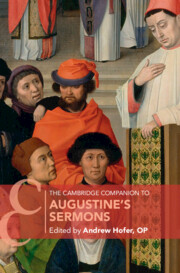Refine search
Actions for selected content:
58 results
4 - A Christological Faith
-
- Book:
- Augustine's Theology of Justification by Faith
- Published online:
- 28 January 2026
- Print publication:
- 05 March 2026, pp 153-201
-
- Chapter
- Export citation
Chapter 9 - Augustine’s Second-Personal Account of the Virtues
-
-
- Book:
- Augustine's ‘Confessions'
- Published online:
- 16 December 2025
- Print publication:
- 22 January 2026, pp 158-171
-
- Chapter
- Export citation
Chapter 4 - Critical Aesthetics and Protectionism
-
- Book:
- Kant and Environmental Philosophy
- Published online:
- 01 November 2025
- Print publication:
- 20 November 2025, pp 98-128
-
- Chapter
- Export citation
4 - Responsibilities of Conscience
-
- Book:
- The Nature and Limitations of Conscience in Healthcare
- Published online:
- 12 September 2025
- Print publication:
- 02 October 2025, pp 62-81
-
- Chapter
- Export citation
Stubborn Fools and the Arrogantly Open-minded
-
- Journal:
- Canadian Journal of Philosophy , FirstView
- Published online by Cambridge University Press:
- 09 September 2025, pp. 1-17
-
- Article
-
- You have access
- Open access
- HTML
- Export citation
Humility and Complexity
-
- Journal:
- Canadian Journal of Philosophy , FirstView
- Published online by Cambridge University Press:
- 20 August 2025, pp. 1-12
-
- Article
-
- You have access
- Open access
- HTML
- Export citation
Chapter 11 - Humility
- from Part V - A Virtue of Indifference
-
- Book:
- Attention to Virtues
- Published online:
- 25 July 2025
- Print publication:
- 14 August 2025, pp 261-296
-
- Chapter
- Export citation
Chapter 5 - On Curiosity as Epistemic Vice
-
-
- Book:
- Heidegger's <i>Being and Time</i>
- Published online:
- 28 June 2025
- Print publication:
- 26 June 2025, pp 84-102
-
- Chapter
- Export citation
Introduction
-
-
- Book:
- The Cambridge Companion to Augustine's Sermons
- Published online:
- 26 May 2025
- Print publication:
- 12 June 2025, pp 1-22
-
- Chapter
- Export citation

The Cambridge Companion to Augustine's Sermons
-
- Published online:
- 26 May 2025
- Print publication:
- 12 June 2025
Anselm on THAT, THIS, and panpsychism
-
- Journal:
- Religious Studies / Volume 62 / Issue S1 / February 2026
- Published online by Cambridge University Press:
- 25 April 2025, pp. S18-S32
-
- Article
-
- You have access
- Open access
- HTML
- Export citation
Chapter 3 - Empathy
-
- Book:
- Essentials of Social and Emotional Intelligences
- Published online:
- 25 March 2025
- Print publication:
- 27 March 2025, pp 63-86
-
- Chapter
- Export citation
Conclusion
-
- Book:
- Judges, Judging, and Judgment
- Published online:
- 03 January 2025
- Print publication:
- 16 January 2025, pp 201-206
-
- Chapter
- Export citation
Introduction
-
- Book:
- Judges, Judging, and Judgment
- Published online:
- 03 January 2025
- Print publication:
- 16 January 2025, pp 1-10
-
- Chapter
- Export citation
Chapter 6 - Deification as Intimacy with God in the Bible
-
- Book:
- Deification in Classical Greek Philosophy and the Bible
- Published online:
- 10 July 2024
- Print publication:
- 27 June 2024, pp 267-304
-
- Chapter
- Export citation
Contemporary Dance on Native Land: Indigenous Solidarity in the Choreography of Ananya Dance Theatre
-
- Journal:
- Dance Research Journal / Volume 56 / Issue 1 / April 2024
- Published online by Cambridge University Press:
- 07 February 2025, pp. 36-55
- Print publication:
- April 2024
-
- Article
-
- You have access
- Open access
- HTML
- Export citation
The Virtue of Humility: Interpreting the Summa Theologiae’s ‘Minimalist Approach’
-
- Journal:
- New Blackfriars / Volume 105 / Issue 4 / July 2024
- Published online by Cambridge University Press:
- 21 February 2024, pp. 370-383
- Print publication:
- July 2024
-
- Article
- Export citation
Theologians Minor: Embracing Our Vocation with Humility
-
- Article
-
- You have access
- HTML
- Export citation
9 - A Crucified People
- from Part III - The Body of Christ
-
- Book:
- An Augustinian Christology
- Published online:
- 02 November 2023
- Print publication:
- 16 November 2023, pp 310-341
-
- Chapter
- Export citation
Conservation, uncertainty and intellectual humility
-
- Journal:
- Environmental Conservation / Volume 50 / Issue 4 / December 2023
- Published online by Cambridge University Press:
- 09 November 2023, pp. 196-201
-
- Article
-
- You have access
- Open access
- HTML
- Export citation
